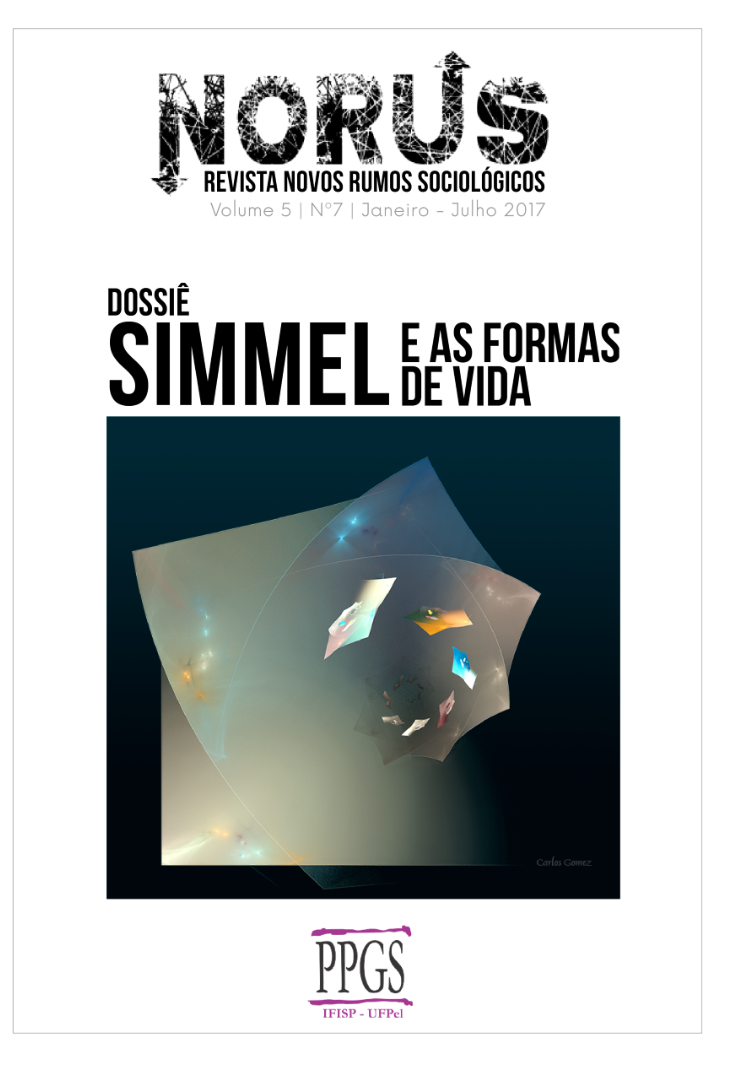THE CONFLICT OF SOCIAL LIFE AND CULTURAL FORMS: SIMMEL’S THEORY OF “QUALITATIVE SOCIETAL DIFFERENTIATION”
Resumo
Simmel’s work has often been interpreted as a succession of disparate phases of development following contradictory epistemological paradigms and intellectual stances, and a similar misunderstanding applies to his theory of societal differentiation. A completely different view emerges of Simmel’s contribution to sociological theory if his process of theory-building is placed at the forefront of analysis along with its specific continuities. The present paper provides a synthetic study of Simmel’s theory of societal differentiation by systematically reconstructing the different stages of its development. It starts with Simmel’s early theory of the parallel differentiation of the social group and the personality of the social actors, thus highlighting that social differentiation can be understood only as a process that takes place both on the level of social action and social structure. The focus then shifts to Simmel’s theory of culture and its relationship to the core of his sociological theory in the so-called a priori of sociation. Finally, the paper shows how Simmel’s late sociological anthropology links the different contributions on social differentiation, cultural sociology and the epistemological premises of sociation in a theory of life forms producing the structuration of “qualitative differentiated societies”.Downloads
Referências
DILTHEY, Wilhelm Einleitung in die Geisteswissenschaften. Versuch einer
Grundlegung für das Studium der Gesellschaft und der Geschichte, Vol. 1
; now in: ______. Gesammelte Schriften, Vol. 1, Stuttgart: Teubner,
DURKHEIM, Émile . De la division du travail social. Etude sur l’organisation
des sociétés supérieures, Paris : Alcan, [1893]. Engl. Durkheim, Émile. The
Division of Labor in Society. New York: Free Press, 2014.
FITZI, Gregor. Soziale Erfahrung und Lebensphilosophie. Georg Simmels
Beziehung zu Henri Bergson. Konstanz: UVK, 2002.
FRISCHEISEN-KÖHLER, Max. Georg Simmel. In: ______. Kant-Studien, 24.
-20.
LUHMANN, Niklas Soziale Systeme. Grundriss einer allgemeinen Theorie.
Frankfurt/M.: Suhrkamp, 1984.
MARX, Karl. Capital: A Critical Analysis of Capitalist Production. London,
, now in Id. (1990), Marx Engels Gesamtausgabe, Vol. 9, Berlin:
Dietz, 1990.
SCHÄFFLE Albert. Bau und Leben des socialen Körpers.
Encyclopädischer Entwurf einer realen Anatomie, Physiologie und
Psychologie der menschlichen Gesellschaft mit besonderer Rücksicht
auf die Volkswirthschaft als socialen Stoffwechsel, 4th Vol. Tübingen:
Laupp, 1875-78.
SIMMEL, Georg Georg Simmel Gesamtausgabe (here cited as GSG). Ed. by
Otthein Rammstedt et al. Frankfurt/M.: Suhrkamp, 24 volumes. 1989-2015.
______. The Philosophy of Money. Third enlarged edition. David Frisby (ed.).
Tom Bottomore and David Frisby (trans). London and New York: Routledge,
______. The View of Life. Four Metaphysical Essays with Journal
Aphorisms. English translation by Levine, D. and Andrews, J.. Chicago:
University of Chicago Press, 2015.
SPENCER, Herbert. Principles of Sociology, 3 vols. London: Williams and
Norgate, 1876/1882–1885.
WEBER, Max. Soziologische Grundbegriffe. [1921] Now in id. Max Weber
Gesamtausgabe I/23 Wirtschaft und Gesellschaft. Soziologie.
The conflict of social life and cultural forms | Gregor Fitzi
NORUS | vol. 5, nº 7 | p. 167-189 | Jan/Jul/2017 189
Unvollendet. 1919-1920. Ed. by Knut Borchardt, Edith Hanke und
Wolfgang Schluchter. Tübingen: Mohr Siebeck, pp. 147-215, 2013.
______. Gesammelte Aufsätze zur Religionssoziologie. Vol. 1. Tübingen:
Mohr Siebeck, 1988a.
______. “Wissenschaft als Beruf” In: ______. Gesammelte Aufsätze zur
Wissenschaftslehre. Tübingen: Mohr Siebeck, pp. 582‒613, 1988b.
Copyright (c) 2017 Autor e Revista

This work is licensed under a Creative Commons Attribution-NonCommercial-NoDerivatives 4.0 International License.
Os Direitos Autorais para artigos publicados nesta revista são do(a) autor(a), com direitos de primeira publicação para a revista. Os artigos são de uso gratuito em aplicações exclusivamente acadêmicas e educacionais e, portanto, não-comerciais.


